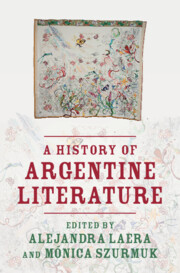Book contents
- A History of Argentine Literature
- A History of Argentine Literature
- Copyright page
- Contents
- Figures
- Contributors
- Editors’ Acknowledgments
- Introduction
- Part I Literary Dates
- Part II Critical Inroads
- Part III Literary Names
- Chapter 21 Sarmiento: Politics, Culture, and Spectacle
- Chapter 22 The Mansilla Siblings: A Story in Syntony
- Chapter 23 Martín Fierro: Subaltern Voices
- Chapter 24 Borges and Argentine Literature: A Detour around the World
- Chapter 25 Roberto Arlt
- Chapter 26 The Ocampo Sisters
- Chapter 27 Alfonsina Storni and Alejandra Pizarnik
- Chapter 28 Displacement and Transfer in Julio Cortázar’s Todos los fuegos el fuego
- Chapter 29 Manuel Puig’s Circuit Bending: Literary Listening against Surveillance
- Chapter 30 Operation Massacre: Dangerous Journalism
- Chapter 31 The Politics of the Poem: From Gelman to Perlongher
- Chapter 32 Scenes from Postmodern Life: Literary Interventions in the Public Sphere
- Chapter 33 Griselda Gambaro and Beyond: A “Dermography” of Contemporary Women’s Theater and Performance
- Chapter 34 César Aira and the Art of Invention
- Index
- References
Chapter 30 - Operation Massacre: Dangerous Journalism
from Part III - Literary Names
Published online by Cambridge University Press: 09 May 2024
- A History of Argentine Literature
- A History of Argentine Literature
- Copyright page
- Contents
- Figures
- Contributors
- Editors’ Acknowledgments
- Introduction
- Part I Literary Dates
- Part II Critical Inroads
- Part III Literary Names
- Chapter 21 Sarmiento: Politics, Culture, and Spectacle
- Chapter 22 The Mansilla Siblings: A Story in Syntony
- Chapter 23 Martín Fierro: Subaltern Voices
- Chapter 24 Borges and Argentine Literature: A Detour around the World
- Chapter 25 Roberto Arlt
- Chapter 26 The Ocampo Sisters
- Chapter 27 Alfonsina Storni and Alejandra Pizarnik
- Chapter 28 Displacement and Transfer in Julio Cortázar’s Todos los fuegos el fuego
- Chapter 29 Manuel Puig’s Circuit Bending: Literary Listening against Surveillance
- Chapter 30 Operation Massacre: Dangerous Journalism
- Chapter 31 The Politics of the Poem: From Gelman to Perlongher
- Chapter 32 Scenes from Postmodern Life: Literary Interventions in the Public Sphere
- Chapter 33 Griselda Gambaro and Beyond: A “Dermography” of Contemporary Women’s Theater and Performance
- Chapter 34 César Aira and the Art of Invention
- Index
- References
Summary
In 1957 Rodolfo Walsh published the first edition of Operación masacre, a thoroughly researched book that denounces the execution by the military régime of a group of civilians a year before. In the next few decades until his disappearance in 1977, Walsh would publish new expanded versions of the text that included documents that supported the veracity of his own investigation. Operación masacre is a rare case of where a political event engenders a new type of writing designed to tell the very story that has inspired it, and in so doing creates a new literary genre. In Operación Masacre, we read a text that is both a new writing and a new genre, produced in the urgency of political intervention, and with the desire to affect it and interpellate it. The relationship between literature and politics is dramatized in this text, as it will soon be dramatized in Walsh´s life. This chapter addresses the constitution of nonfiction in Walsh´s text, the relationships with his other works, and his legacy after his kidnapping and ensuing disappearance in 1977 at the hands of the military dictatorship.
- Type
- Chapter
- Information
- A History of Argentine Literature , pp. 472 - 488Publisher: Cambridge University PressPrint publication year: 2024

